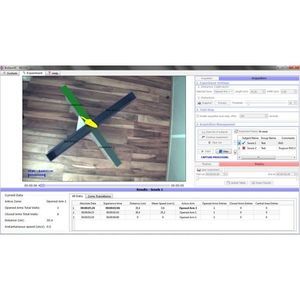
Tail suspension test animal research cage BIO-TST5for preclinical researchfor micefor rats
Add to favorites
Compare this product
Characteristics
- Applications
- for preclinical research, tail suspension test
- Animal type
- for mice, for rats
- Configuration
- modular
- Length
50 cm
(19.7 in)- Width
15 cm
(6 in)- Height
30 cm
(11.8 in)
Description
Bioseb's version 5 of the Tail Suspension Test system, based on both strain sensors and video acquisition, is the only fully automatic solution in the world for running a simple and objective despair test on mice. It is a fast, painless, and reliable way for testing psychotropic effects from stimulant doses of drugs such as anti-depressants and sedatives. This classic and painless research test for anxiety and depression is now offered with a new, powerful and modern software, in a wireless, bluetooth-based version.
The tail-suspension test was developed as an alternative to the Porsolt Forced Swimming test, and is based on a similar concept. Mice, suspended by their tail using a piece of tape (a painless method), innately attempt to escape from this adversive situation. However, following failed attempts to escape, they experience a kind of despair and become immobile. The magnitude of immobility is considered to be correlated with the depressive-like state of the subjects and is significantly decreased by antidepressants. The Tail Suspension Test was described in the 80's by Steru & al. and allows for fast evaluation of drugs' (anti-depressants, sedatives) psychotropic effects, making it a classic and painless research test for anxiety and depression.
BIOSEB' Tail Suspension Test system is the only full automatic test in the world!. It is based on the original “ITEMATIC-TST” described by Steru in 1987, it uses both strain gauges and video backup recording, and does not induce any pain in the animal: the mouse’s tail is simply stuck to the sensor using a piece of tape.
Catalogs
No catalogs are available for this product.
See all of Bioseb‘s catalogsExhibitions
Meet this supplier at the following exhibition(s):


Related Searches
- Anatomy model
- Demonstration anatomical model
- Demonstration simulator
- Thermometer
- SpO2 monitor
- Surgical anatomical model
- Digital thermometer
- Surgical simulator
- Infrared thermometer
- Non-contact thermometer
- Whole body anatomical model
- Pad simulator
- Probe thermometer
- Compact pulse oximeter
- Emergency care simulation unit
- Articulated anatomical model
- Suture simulator
- Animal research cage
- Modular animal research cage
- Wound management simulator
*Prices are pre-tax. They exclude delivery charges and customs duties and do not include additional charges for installation or activation options. Prices are indicative only and may vary by country, with changes to the cost of raw materials and exchange rates.



